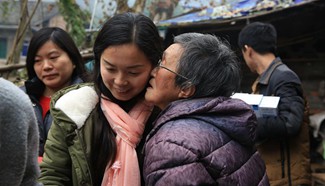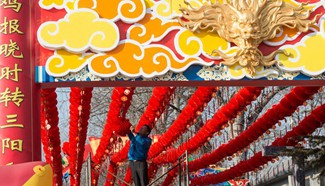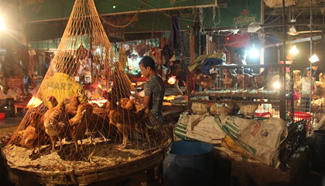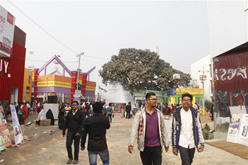BEIJING, Jan. 24 (Xinhua) -- As the Chinese Spring Festival approaches, local disciplinary organs are strengthening in the anti-corruption battle.
Chinese people traditionally give out "red envelopes" to friends and relatives, especially to children, during Spring Festival, or Chinese Lunar New Year, to bring good luck and happiness. However, the tradition had been misappropriated by corrupt officials who use it as an opportunity to flatter their bosses.
This year's Spring Festival falls on Jan. 28. A week-long holiday is usually a peak banqueting period with much celebration and exchanging of gifts. It was once common for officials to fund such an occasion with public money.
Since the 18th Communist Party of China (CPC) National Congress in 2012, China has stepped up its anti-corruption efforts. Frequent notices and guidelines on discipline have attempted to purify the political air, preventing the tiny seeds of transgression from growing into major trees of corruption.
BETTER SOCIAL MODE
The spread of corruption has been effectively contained and the battle against corruption has gained crushing momentum, but the government is not resting on its laurels.
"Fewer people come to offer gifts before the Spring Festival. Also, fewer officials receive gifts now," said a township head in Liling City, central China's Hunan Province. "We enjoy a much better social mode now," he said.
A manager on a real estate project in east China's Fujian Province confirmed things had changed for the better.
"Phone calls and visits have been refused (by local officials), let alone the receiving of gifts," he said.
"Disciplinary authorities in Changsha (capital of Hunan) have detected few corruption cases, as most CPC members have improved awareness of rules and their discipline in a tough anti-corruption atmosphere," said Yu Yongbing, an official with the city's discipline inspection commission.
Some local officials also vowed to refuse gifts and serve as role models for other cadres.
Leading officials in the city of Chenzhou in Hunan signed a letter of commitment on Jan. 12, vowing to refuse "red envelopes." So far, all county-level officials in Chenzhou have signed.
MISCONDUCT IN COVERT WAYS
However, covert use of public money in gift-giving, dining and traveling, as well as other extravagant consumption, has not been completely rooted out, posing more challenges for supervision by disciplinary authorities.
"Some new subtle forms have emerged," said Chen Hui, secretary of the discipline inspection agency of the CPC in Chengfeng Township, Yongtai County of Fujian. "People tend to send 'red envelopes' via the popular online payment services provided by Alipay and WeChat. Digital gift cards are also making it easier to circumvent anti-graft watchdogs. It is difficult for us to detect," he said.
Hu Chaofeng, another discipline inspection cadre in the county, said punishment and supervision should be strengthened as indulgence would lead to unhealthy practices.
Using public money for feasts has shifted from restaurants to less noticeable places in recent years. Some banquets are even held in residential buildings.
Fujian's discipline inspection authorities have launched a campaign to strengthen supervision before Spring Festival, especially targeting covert gifting.
During the campaign, two leading heads of Yunxi Village in Dehua County were found using 193,000 yuan (28,174 U.S. dollars) of public funds to buy local products as gifts to send to others via delivery companies. They were also found using public money to feast in rural courtyards.
TOUGHER MEASURES
The Central Commission for Discipline Inspection (CCDI) of the CPC have ordered local inspectors to step up supervision and discipline ahead of Spring Festival.
To avoid government cars used for private purposes, Hangzhou, capital of east China's Zhejiang Province, has installed GPS systems on official vehicles.
"The parking, dispatching and driving routes of each government car is under supervision by the city's official vehicle service center," said Chen Gu, director of the center.
Government officials and even vice mayors of the city always take a bus or the subway to go home after work or big evening events.
"They have got used to it," Chen said.
"Many government officials drive their own cars to work, ride bikes or take a bus," said Lou Yunju, a local discipline inspector.
"The city government has signed contracts with property management companies asking them to manage their entrance guards, and all kinds of gifts and goods are not allowed to be stored in the reception office," said Xiong Xiong, the publicity chief with the city's discipline inspection commission.
A number of local discipline inspection agencies in Zhejiang have included express delivery receipts in their investigation, to prevent covert gift giving.
Before Spring Festival, the discipline inspection authorities of many cities, including Beijing, Shanghai and Guangzhou, also issued statements to order Party members to prevent "festive corruption."











